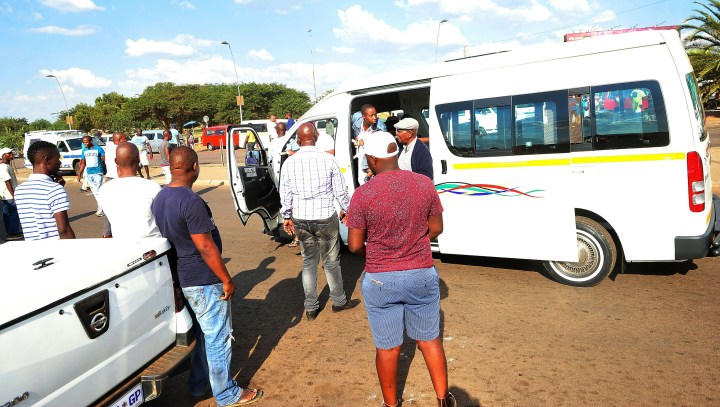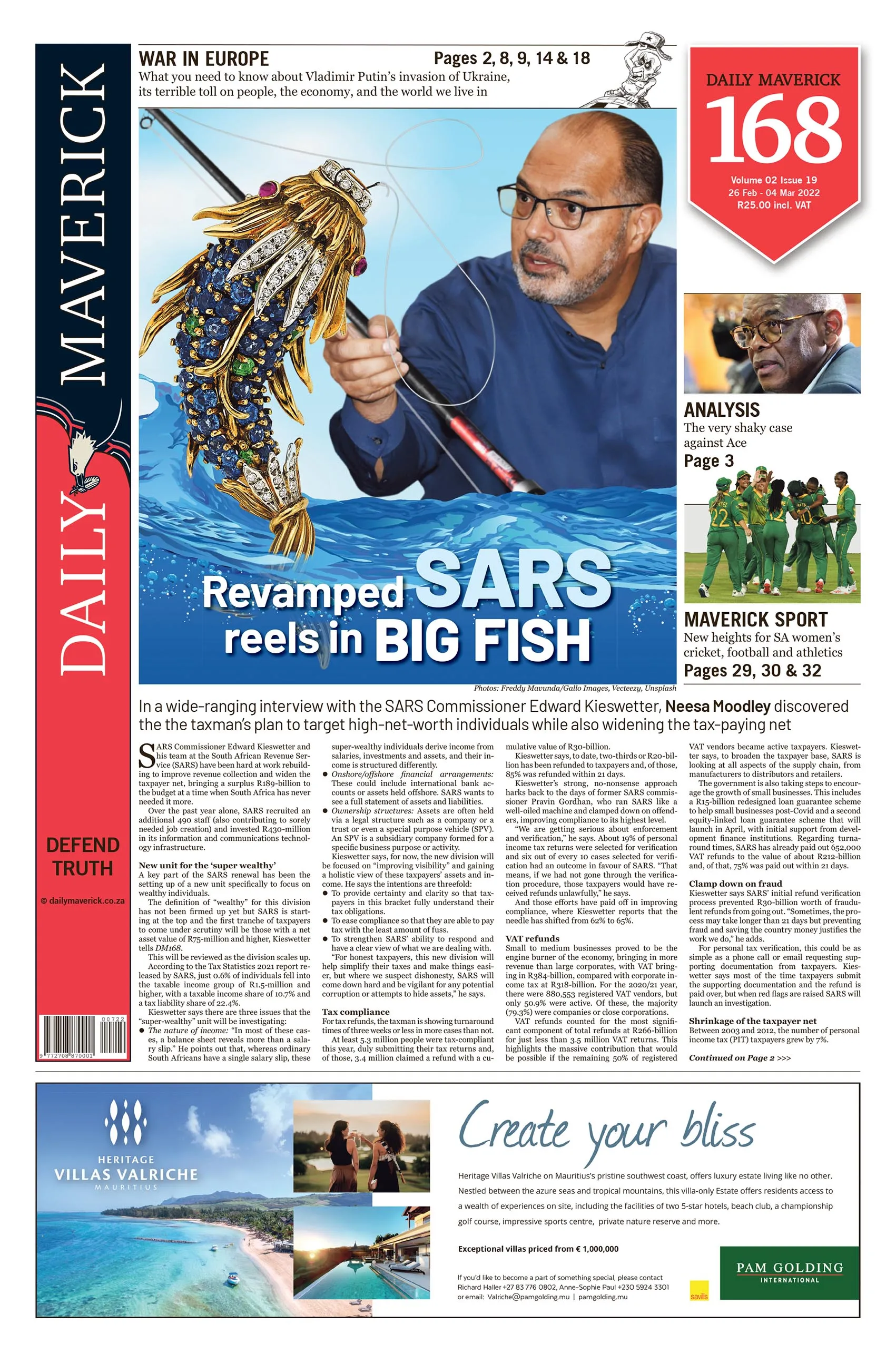POLITRIX
When gangsters came to the party: The ANC’s links to Tshwane’s ‘Boko Haram’

Certain ANC leaders have admitted the party has been infiltrated by the gang synonymous with extortion, death and violence, but getting further information from the ANC has proved tricky, including questions about how Boko Haram may have benefited from such political links.
Despite senior leaders admitting Tshwane gang Boko Haram had infiltrated the ANC, the party has failed to explain the links with a network of crime that extorted local businesses and spread violence across the city’s townships.
Ahead of the 2021 local government elections, ANC leaders David Mabuza, Kgalema Motlanthe, Jessie Duarte and Fikile Mbalula met a group of party members from Tshwane who were frustrated that they weren’t nominated as ANC councillors.
Mbalula, the party’s election campaign leader, said most of the complaints were illegitimate. He then referred to “an element of thuggery” that had “infiltrated the ANC”.
“We have funny characters and names and organisations called Boko Haram,” said Mbalula at St George’s Hotel in October. “The extent of the infiltration […] we feel it in the expression of the anarchy, we see that is un-ANC. Also, losing candidates are engaging in acts of sabotage against the ANC campaign process.”
In a recent clip on Power 98.7, Deputy President David Mabuza made the same revelation – members of “Boko Haram” had formed a faction of the ANC in Tshwane.
Boko Haram is a notorious Tshwane gang that took its name from the Nigerian terror group (with no links between the two). The Nigerian group has staged bombings, assassinations and abductions in its attempt to form an Islamic state.
To residents of the Tshwane township Mamelodi, the local gang Boko Haram is synonymous with extortion, death and anguish.
It started as a forum for young businesspeople in Mamelodi but morphed into a criminal gang, demanding local and foreign-owned businesses pay a “protection fee” and forcing construction companies to give it a cut in infrastructure projects.
Its origins go back to a South African National Civic Organisation (Sanco) initiative aiming to encourage, rather than force, construction companies to partner with local forums.
“The idea of asking for shares and subcontracts on behalf of local businesspeople in and around Tshwane is actually a Sanco initiative. But Sanco used negotiations and legal means towards this end. Boko Haram hijacked the idea and used extortion to capture almost all businesses in Tshwane from 2017,” griped Sanco Tshwane regional chairperson Abram Mashishi.
“This is a case of a noble idea falling into wrong hands as the gangsters’ modus operandi is to stop the progression of any and all construction projects whose owners are not prepared to rope them in as partners in their ventures,” Mashishi continued.
A Mamelodi resident, who did not want to be named but supported the group until it went rogue, said: “The local Boko Haram gang started off as a business forum. It was formed by unemployed youth who wished to make a difference in the community. The forum agitated for the employment of local Mamelodi youth at various businesses in the township, especially at the malls. It also supported the idea of local businesspeople being granted some shares or subcontracts in construction projects taking place in and around Tshwane.”
He continued: “Many unemployed people and budding entrepreneurs had so much trust in the group to the extent that they even submitted their CVs and business plans to the group. The unemployed hoped the group would facilitate job placements for them, while entrepreneurs hoped the group would facilitate funding for their respective enterprises.
“But the road to perdition is paved with good intentions. Soon the group morphed into a bunch of gangsters who terrorised foreign-owned spaza shops, local businesses, taxi drivers, construction companies and the community of Mamelodi in general. All this in pursuit of what the group calls ‘protection fee’.”
Sanco’s Mashishi rattled off a list of projects that came to a halt when the gang’s members, representing themselves as a “business forum”, demanded a cut.
“Road construction projects belonging to King Civil and Umso Construction, respectively, in Mamelodi were recently brought to a halt as the owners of these projects refused to enter into negotiations with Boko Haram. The owners of Fikile Construction, who were tasked with building the local magistrates’ court in Mamelodi East, were compelled to abandon the project eight years ago as they didn’t want to give Boko Haram a slice of the pie in the project,” he said.
DM168 attempted to get comments from the companies involved. Umso Construction, which was leading the R285-million rehabilitation of Solomon Mahlangu Drive, said it was forbidden from speaking to the media.
In 2018, Boko Haram members were involved in running gun battles with rival criminal gangs for the right to be awarded subcontracts by various companies that were involved in the refurbishment of Mams Mall shopping complex in the east of Mamelodi.
Boko Haram’s alleged criminal activity extended beyond extorting businesses in construction projects. One informal taxi driver who did not want to be named for fear of a backlash said he and other drivers who do not belong to a formal taxi association were forced to pay R50 weekly to Boko Haram as a “protection fee”.
He said gang members would stop informal taxi drivers on the roads of Mamelodi to demand the fees. Failure to pay would result in one being prevented from operating as a taxi driver in the township.
After the 2014 xenophobic attacks in Mamelodi, Boko Haram saw an opportunity to extort money from foreign-owned spaza shops. They promised the foreigners they would be protected from marauding township residents.
“This was a fallacy, as Boko Haram had actually encouraged residents to loot foreign-owned spaza shops during the xenophobic mania,” fumed Muhammad Hassan, a foreigner who owns a spaza shop in the township.
Hassan revealed that he and his fellow foreign spaza shop owners were forced to part with R400 to R500 every month as a tribute to Boko Haram.
The demise of the gang started in earnest in March 2019, when two members were arrested for trespassing, money laundering, extortion and drug dealing.
“The gang members had illegally occupied the Mamelodi West Hostel where they sold the drug ‘nyaope’ and demanded monthly rent payments from hostel inmates. The hostel is the property of the City of Tshwane and the two Boko Haram members are alleged to have collected over R11-million in rent payments from 2017 to 2019,” said police spokesperson Brenda Muridili.
“In June 2019, two other alleged Boko Haram members were arrested for extorting money from taxi drivers and foreign-owned spaza shops. In July last year, three of the gang’s members, including an ANC branch secretary, were arrested at a construction site in Silverton near Mamelodi, where they had gone to demand money from the project owner and [threatened] to shut down the project if he didn’t adhere to their demand,” she continued.
“Police have been investigating the Boko Haram gang since 2018 and have arrested five of the gang’s members so far. But these suspects have not been prosecuted because, when their cases went to court, complainants withdrew charges against them.”
She said the police don’t know the reason behind the withdrawal of charges by various complainants against Boko Haram members because cases are withdrawn in court and not at police stations.
In July 2020, Gauteng MEC for roads and transport Jacob Mamabolo disbanded the executive of the Mamelodi Amalgamated Taxi Association (Mata), which was dominated by Boko Haram members. Mamabolo opined that the executive committee was responsible for the deaths of its own members in a “taxi war” that engulfed Mamelodi in June 2020.
The murder of Mata officials started as far back as November 2014 when its chairperson Lucky Mahlangu, secretary Busang Maubane and committee member Oscar “Patch” Letsoalo were shot and killed in one week.
In July 2020, 19 people, including taxi owners, drivers and their families, were gunned down in one month. “The taxi business must be run through scrupulous means, not by the barrel of the gun,” lamented Mamabolo. According to Muridili, at least 13 of the gang’s members were shot and killed at various places in and around Mamelodi from August to October 2021, including alleged gang boss Given Mnguni, who was gunned down on the N4 highway in October. He had been described as the police’s number-one suspect for crimes related to Boko Haram.
While the police do not appear to have arrested any suspects involved in the series of killings of Boko Haram members, many Mamelodi residents are adamant one person is behind them. They dubbed the killer “John Wick” after Keanu Reeves’s character in the film franchise who takes ruthless revenge on his enemies.
SAPS, however, has suggested the murders might relate to a battle between the gang and a breakaway group, known as Bafarasai.
While ANC leaders have admitted that Boko Haram had infiltrated the party, with Mbalula and Mabuza admitting as much, questions about the extent of the group’s links to ANC structures and how the gang may have benefited from such political links, went unanswered.

Deputy President David Mabuza said Boko Haram members have formed a faction of the ANC in Tshwane. (Photo: Gallo Images / Netwerk 24/ Deaan Vivier)
ANC Tshwane regional chairperson Dr Kgosi Maepa told DM168 he didn’t know anything about the gang’s links to the party. He said he had only heard rumours and perhaps more senior ANC leaders had better intelligence on the issue. That’s despite the arrest of a local branch official of the ANC in Silverton who is alleged to be using the same extortion modus operandi as Boko Haram to get “protection fees” from businesses and project owners.
Pule Mabe, the ANC’s national spokesperson, failed to respond to requests for comment.
Fred Nel, the DA’s shadow MEC for roads and transport in Gauteng, said he would not be surprised if Boko Haram had formed a faction of the ANC in Tshwane. He questioned whether the gang may have been linked to the murder of DA member Abram Sello, who was killed at Mamelodi Hostel in 2019 after opposing the gang’s occupation, rent seeking and drug dealing at the hostel.
Mamelodi residents welcomed the gang’s downfall and remained suspicious of its links to the ANC.
“I have suspected all along that the ANC was shielding these chaps from arrest. Boko Haram is obviously contributing to the coffers of the ANC with the loot from fraudulent tenders and extortion money. If that is not the case, why doesn’t the ANC kick them out of the organisation?” claimed James Masuku, a local businessman who had a run-in with the gang for refusing to pay a “protection fee”.
An informal taxi driver said he and his fellow drivers are now free to make an income without fearing that Boko Haram will demand a cut. He vowed that he would never vote for the ANC again owing to its links to the group. He did not want to be named.
An Ethiopian spaza shop owner, who gave his name as Simon, said that since the killing of Boko Haram members, nobody has come to his shop demanding a “protection fee”.
Phomolong informal settlement community leader Duke Masemola said: “I am happy that Boko Haram has been destroyed. Those guys beat me up at a community meeting in broad daylight in 2014 after I contradicted former City of Tshwane mayor Kgosientso Ramokgopa regarding service delivery issues in our community. I laid a charge at the Mamelodi East police station […] but those thugs were never arrested.”
One young man whose father was killed during the taxi violence in Mamelodi said: “What goes around comes around. Boko Haram members have met their comeuppance. My father will rest in peace knowing that his killers are also dead. But he would probably be disappointed to learn that his killers were associated with the ANC.” DM168
This story first appeared in our weekly Daily Maverick 168 newspaper which is available for R25 at Pick n Pay, Exclusive Books and airport bookstores. For your nearest stockist, please click here.

[hearken id=”daily-maverick/9194″]



















 Become an Insider
Become an Insider
It’s good the ordinary citizens are awake to this. There future depends on ensuring those militias don’t get a foot hold like they have all over Africa. The continent is crawling with them.
Is there ANY corruption cANCer does not have a hand in?
Every gang and gangster has links to the anc. Why should anyone be surprised?